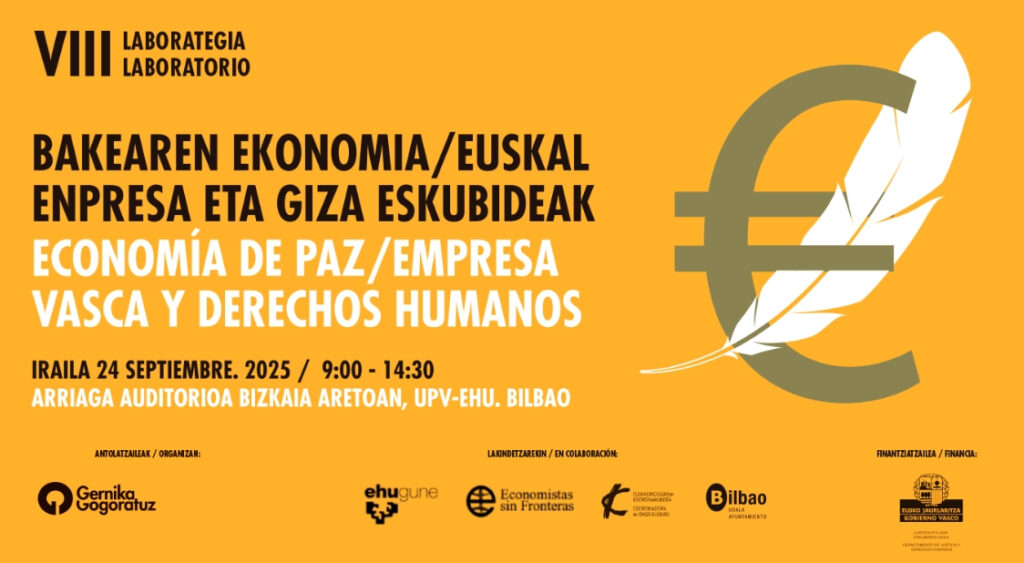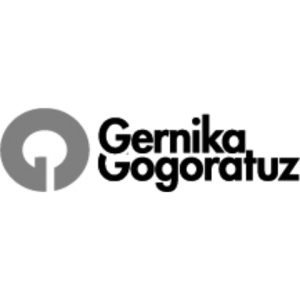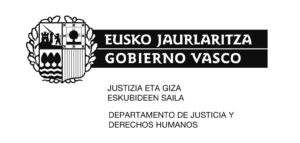Gernika Gogoratuz, Peace Research Centre, proposes this laboratory for the eighth consecutive year as a space where civil society, administrations, universities and the private sector can share information, engage in dialogue and reflect on an equal footing on the contribution of the economy to peace and the performance of Basque companies and organisations in relation to human rights.

VIII LABORATORY OF ECONOMY OF PEACE AND HUMAN RIGHTS AND BASQUE COMPANIES
VIII LABORATORY OF ECONOMY OF PEACE AND HUMAN RIGHTS AND BASQUE COMPANIES

SCHEDULE
9:00-9:30 Opening.
- Igor Ahedo. Coordinator of ehuGune, UPV-EHU
- Ainhoa Zugasti. Director of Human Rights and Victim Support for the Basque Government.
- Nerea Uriarte. President of the Basque Country NGDO Coordination Committee.
- María Oianguren. Director of Gernika Gogoratuz. Peace Research Centre.
9:30-10:30 Opening lecture: From unrest to care: reimagining the economy at the service of life.
- Imanol Zubero Beaskoetxea. Doctor of Sociology and Diploma in Theology. Professor at the University of the Basque Country. He has researched crises and democratic experimentalism, social innovation, emerging practices and new institutionality.
10:30-12:00 Economics for life: structural violence and contemporary discontents.
- Iñaki García Maza. Psychologist specialising in community mental health; works with people suffering from various psychosocial problems. He is president of the Basque Association of Gestalt Therapy Zimentarri, a full member of the AETG and coordinator of the Erain Humanistic Psychotherapy Centre.
- José Ramón Landarroitajauregi Garai. Psychologist, therapist, teacher, educator and writer. Considered one of the leading figures in Substantive Sexology, he is the founder and first president of the State Association of Sexology Professionals (AEPS), founder of the Institute of Substantive Sexology (ISESUS), and director of the Biko Arloak couple’s counselling centre.
- Ana Saenz Berbejillo. Psychologist specialising in ProCC Methodology, which she developed in the Health and Consumer Affairs Department of Bilbao City Council, working with parents, teenagers, teachers, etc. She teaches ProCC Methodology at the Marie Langer Centre, which addresses the discomforts of everyday life from a critical perspective on lifestyle and with an intervention method that encourages the population to take a leading role and participate in resolving their contradictions.
Moderator: Andreas Schaefter (Gernika Gogoratuz).
12:00-12:30 Coffee break.
12:30-13:30 Human Rights and Basque Business Programme: Advances and Setbacks in Due Diligence in Human Rights and Corporate Sustainability.
- International Perspective on National Business and Human Rights Plans (Online).
Jernej Letnar Cernic. Professor of Human Rights and Constitutional Law at the European Faculty of Law and the Faculty of Government and European Studies at the New University (Ljubljana, Slovenia).
- Economic security, the green deal and corporate due diligence in the new geopolitical context (Online).
Carmen Márquez. Professor of Public International Law and International Relations at the University of Seville. President of the European Inter-University Centre for Human Rights and Democratisation.
- Considerations on personal and collective responsibility in a challenging regulatory environment.
Maria Prandi. Founder and Chief Executive Officer of BHR (Business and Human Rights). Barcelona.
Moderator: Iker Atxa (Gernika Gogoratuz).
13:30-14:00 Horizontal dialogues: questions, reflections and contributions from participants.
- Iker Atxa. Gernika Gogoratuz.
2:00 p.m. Summary of conclusions: sharing and closing remarks.
- Jokin Alberdi. UPV/EHU and Gernika Gogoratuz.
Organise

In partnership with



Funding
